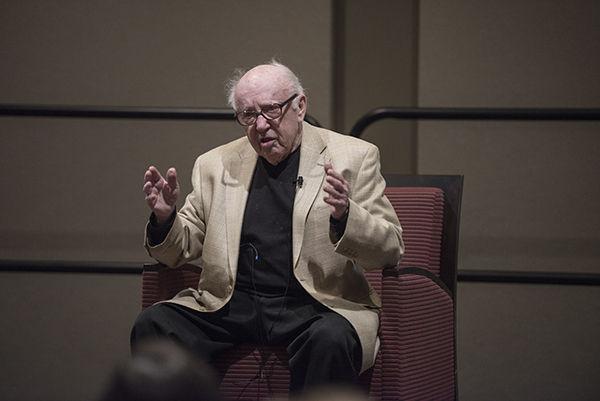“Your mind is a camera,” Al Marks said. “You may not want to remember what is there.”
Al Marks, who survived four Holocaust concentration camps between ages 13 to 15, visited the Texas A&M campus Wednesday as a part of the Texas A&M Hillel Holocaust Survivor Lecture Series. Marks told his story of survival, hope and life in the camps.
Marks credits his survival to his hopefulness.
“Everyday, every minute, every hour, you just wanted to leave,” Marks said about living in the camps. “By nature I’m an optimist. That’s the reason I’m alive because I stayed the optimist even in my four concentration camps, I survive.”
Marks, who is originally from Hungary, now lives in Houston. Marks said he grew up with a loving father and mother and was separated from them in Auschwitz.
“My mother was standing next to me. And she was motioned to my right and that was the last time I saw my mother. And I was motioned to the left,” Marks said.
Marks said he knew what was happening when he and his parents were separated.
“I didn’t have a chance to say goodbye or hug her. We knew what that meant just by reading because all the people who went on the other side they were sent to a room that they could shower. But instead of showering gas came out…so that was Auschwitz,” Marks said.
After being separated from his parents, Marks said life in the camps only got harder.
“And that’s when I started to see the people I never want to remember. Those were brutal years, but we still have to talk about it because it happened,” Marks said.
Marks recalled when he came face to face with the infamous Dr. Mengele, who is known today for the unethical medical experiments he performed upon concentration camp prisoners at Auschwitz.
“June 6, 1944 was the invasion and was also the day we arrived in Auschwitz. And I faced the famous Dr. Mengele,” Marks said.
Dr. Mengele often experimented on children, which Marks said he and the others knew. Mengele would select certain children to do lethal experiments on, especially twins. Others, Mengele would decide if they lived or went to the gas chambers.
“When the experiment was over… those children were sent to the gas chambers.” Marks said.
Jews were not the only people in the concentration camps, and Marks said the horrors faced in the camps are a part of multiple histories.
“After I was separated not to go to the gas chamber immediately…we were sent to Melk,” Marks said. “Ironically Melk was bombed by the American Air Force shortly after I got there on July 8, 1944. We lost over 600 people. All these horrible dates talking about it — it didn’t only happen to the Jewish prisoners — it happened to everybody that was there.”
Marks said the days were dark and there was only one goal — stay alive.
“Our only purpose was as I remember – try to stay alive,” Marks said. “We got very little to eat and there was absolutely nothing more than work or die. And work was building tunnels.”
The SS or Natzi Germans showed no kindness, Marks said.
“I never recall a single episode of any compassion from any SS or certain not of any Hungarians because if they were regular Hungarian soldiers who were drafted they were maybe afraid to show any compassion. And the Germans who were the SS, they didn’t care and certainly didn’t try to be compassionate,” Marks said.
Marks described his time in the camps as cruel and horrible years. Marks said once he was liberated, he moved to America.
“The rest is just a typical story. I was fortunate to get to this great country. I served two years in the U.S. army during the Korean War. I went to high school and life became a bowl of cherries because there is nothing like freedom,” Marks said. “When you have your freedom, you have everything.”
The first thing he valued most after liberation was his freedom, Marks said.
“The other thing you value most is your chance for a happy family life,” Marks said. “And if you don’t have a family then the third thing I would say for a person who has nobody there’s always, always a chance to create somebody that’s close to you…to enjoy the good in life with somebody,” Marks said.
Talking to young people about the Holocaust is important, Marks said.
“I consider it a privilege, especially when I have a chance to talk to younger people. Younger people are the future,” Marks said.
Holocaust survivor shares experiences from four concentration camps
December 3, 2014

Allison Bradshaw — THE BATTALION
Al Marks shared his experience in the Holocaust at a lecture series by Texas A&M Hillel on Wednesday.
0
Donate to The Battalion
$1765
$5000
Contributed
Our Goal
Your donation will support the student journalists of Texas A&M University - College Station. Your contribution will allow us to purchase equipment and cover our annual website hosting costs, in addition to paying freelance staffers for their work, travel costs for coverage and more!
More to Discover









